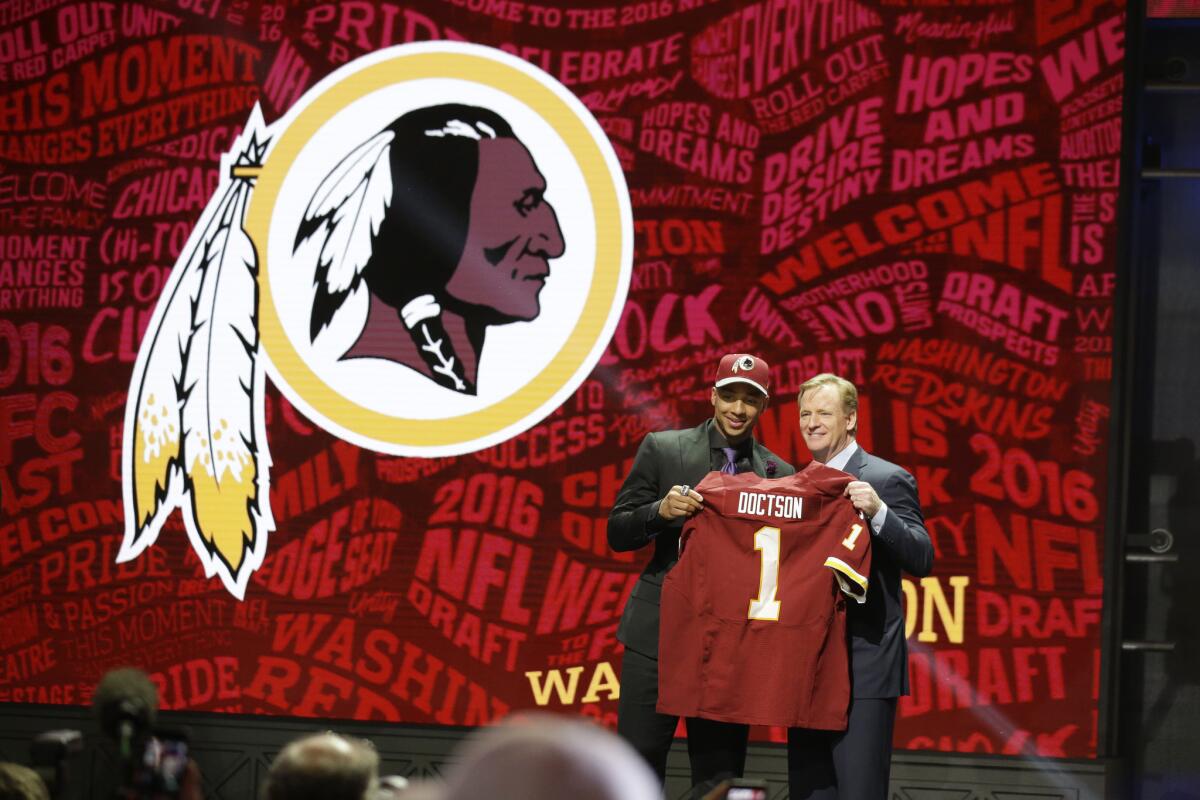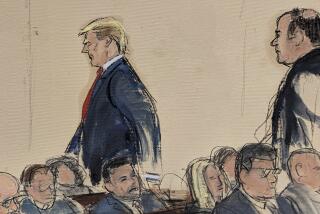Editorial: Even if the name ‘Redskins’ is hateful, it deserves 1st Amendment protection

TCU’s Josh Doctson with NFL Commissioner Roger Goodell after being selected by the Washington Redskins in the first round of the 2016 NFL football draft on April 28.
The Supreme Court may rule sooner than expected on whether the Washington Redskins are entitled to trademark protection for their controversial name. The outcome, we hope, will be a holding by the court that the U.S. Patent and Trademark Office may not withhold trademark protection from a business or product just because its name is offensive.
“Redskins” certainly is offensive to native Americans and demeaning to the team and its fans. We have urged the owners to find a new name. But the legal issue is whether the 1st Amendment was violated in 2014 when the patent office canceled the Redskins’ trademark registration, citing a law that prohibits trademark protection for names that “may disparage ... persons, living or dead, institutions, beliefs, or national symbols, or bring them into contempt or disrepute.”
“Redskins” certainly is offensive ... We wish the owners would find a new name. But the legal issue is whether the 1st Amendment was violated.
A federal district judge upheld the patent office’s ruling in the Redskins case. But a federal appeals court in Washington came to the opposite conclusion last December when it ruled that the patent office wrongly denied trademark registration to The Slants, whose name is intended to comment ironically on a slur against Asian Americans.
Now the football team is asking the justices to fast-track its appeal if they also take up the federal government’s appeal of the decision in favor of The Slants. The court should resolve both cases in favor of the trademark applicants.
In defending the constitutionality of the so-called disparagement clause, the Justice Department notes that a denial of trademark registration does not actually prohibit any speech or bar the team from calling itself the Redskins.
But that’s not the point. Trademark registration provides certain benefits to the holder that shouldn’t be dependent on whether or not the government likes the message a particular name conveys. As the appeals court concluded in the case of The Slants’ trademark, withholding registration for that reason amounts to “viewpoint discrimination” in violation of the 1st Amendment.
By making that clear, the Supreme Court would be true to its free-speech precedents. And such a decision would be a welcome rebuttal of the view — especially popular on college campuses — that speech that is wounding to minorities or others isn’t protected by the Constitution. A 2015 survey of U.S. undergraduates found that 35% of respondents thought — wrongly — that “hate speech” wasn’t protected by the 1st Amendment.
No doubt some people regard names like “Redskins” and “The Slants” as not just offensive but hateful. But under the 1st Amendment government may neither outlaw their use or punish businesses that use such language. The purpose of the trademark system is to protect property rights, not to establish an index of forbidden words.
Follow the Opinion section on Twitter @latimesopinion and Facebook
More to Read
A cure for the common opinion
Get thought-provoking perspectives with our weekly newsletter.
You may occasionally receive promotional content from the Los Angeles Times.






